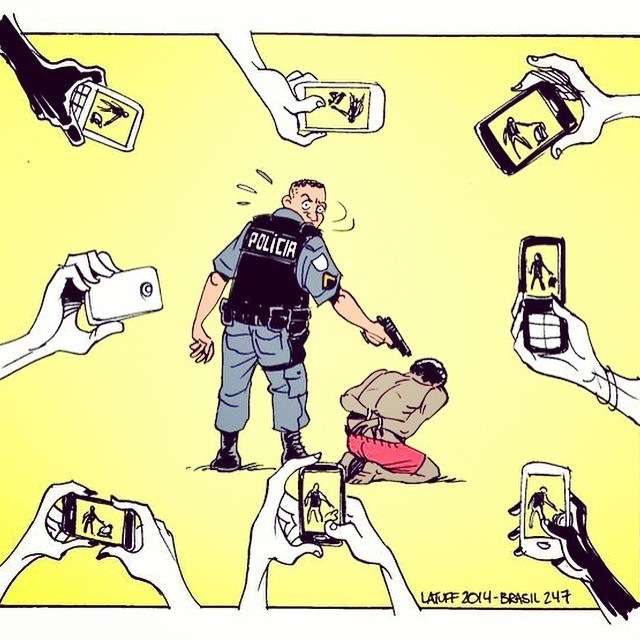Why aren’t we holding cops to a higher standard?
by Eric Peters |
EricPetersAutos.com
That we have a cop problem is obvious, but how to fix it, not so much.
The problem – a chunk of it, at any rate – derives from an overweening postmodern concern for the “safety” of cops to the detriment of those they (ahem) serve. Plus what’s known in the lawyer game as qualified or (worse) sovereign immunity. It means they get away with doing things that would ruin ordinary people who did exactly the same things.
It’s a crazy idea.
If, that is, you don’t want to end up with a Cop Problem.
Take any group of people and make it known that even when they do something criminal, they will be held less responsible for the doing of it – and what do you suppose is likely to happen?
Bingo.
And, duh.
How about holding them – if they’re cops – more responsible?
Applying unto them a higher standard?
There is something ludicrous about the current dynamic – which (as an example) places exacting legal obligations – and repercussions – on the shoulders of ordinary citizens who possess a permit to carry a gun. If such a person so much as reveals the gun in a threatening manner it is brandishing – a felony and as serious as cancer. If an ordinary citizen fires that gun he had better be able to adduce compelling evidence that he did so under the most extreme duress, his own life in clear and present danger.
Or, how about striking another person – including minor children? A parent who smacks a kid on the rump to discipline him opens himself up to child abuse prosecution. What happens when a cop body slams a minor child? It’s accepted. Or at least, tolerated.
It shouldn’t be.
Is there any sane reason why a lesser standard should be applied to cops? Who are after all trained and supposedly more able than ordinary folks to exercise judgment as well as restraint?
Does anyone, upon reflection, doubt that the chief reason (or one of them, at any rate) why we have a Cop Problem is precisely because less is demanded of cops than of ordinary folks when it comes to the exercise of judgment and restraint?
In economics, there are these things called incentives. You want more of something, you encourage it by incentivizing its manufacture and consumption. To get less, you discourage it – typically, by making whatever it is cost more.
It ought to cost cops more when they fail to exercise at least the judgment and restraint we expect of ordinary people; but most especially when they resort to violence unnecessarily or excessively.
We’d then get less unnecessary and excessive violence.
So, not just the normal criminal (and civil) consequences that an ordinary Joe would face in the event, say, of a reckless discharge of a firearm that ended up with some other person injured or dead. A more severe standard for those who enforce the laws.
For exactly that reason.
Cops are given the literal power of life and death over us; its exercise had better be justified beyond any shadow of a doubt. We have a Cop Problem because hardly a week (often, hardly a day) goes by without a video or some such cropping up that clearly shows unjustified exercise of this power. It is infuriating. More so, when the follow-up news story reveals – as it often does – that the offending officers were not placed in handcuffs and frog-marched to a cage, as any of us would have been given identical actions. This is social dynamite – and if an explosion is not wanted, someone had better throw water on the cordite.
Twenty years for the cop – when an ordinary citizens would get ten for the same offense. This would be a step in the right direction.
It would require amending the law, so that different (more severe) penalties would apply to those empowered by the law to use violence for other than purely defensive purposes. But sometimes, it is necessary to adjust the laws. (It is already the case that if a trained/professional fighter hits you, he opens himself to more serious consequences than a regular Joe who threw a punch would face.)
Personal liability would be another valuable reform.
If an ordinary person, as an example, drives his car in a reckless manner and ends up killing an innocent person who happened to be in the wrong place at the wrong time, his family can sue the pants off the guilty party, leaving him destitute. But when a cop does such a thing, he may never have to pay out a dime – although the county or city he worked for ends up paying out millions. Which of course is a malaprop, since counties and cities have no monies except for such as they mulct from the ordinary people who pay the taxes that finance the operation. Thus, the affront is doubled. The person responsible is not held responsible while the people who weren’t responsible are held responsible.
More social dynamite.
You might as well give your teenaged son a bottle of Jack Daniels, the keys to your Corvette – and let him know you’ll buy him a new one if he wrecks it.
Some professions require the individual to be insured; contractors, for example. Why not apply the principle to cops? If they behave prudently – responsibly – they have nothing to fear. But if not…
Which is as it ought to be.
These two measures alone, if enacted, would probably tamp down at least two-thirds of the current Cop Problem and restore a degree of sanity to the situation now sorely lacking.
Which, probably, is why it will never happen.



